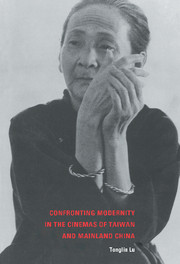Book contents
Introduction
Published online by Cambridge University Press: 12 January 2010
Summary
In traditional China, Confucian scholars repeatedly stated, “Wen yi zaidao” or “Writing must carry the Tao” (Tao here means principle, moral, ethics). During the twentieth century, many of their descendants, modern Chinese intellectuals, have explicitly rejected this concept in the process of modernization (or westernization). For better or worse, however, they still remain committed to the Tao – even in their “pure” and “apolitical” cultural productions. In most of these cases, the “purity” is mainly resistance to the dominant ideology, as in the school of “art for art's sake” (wei yishu de yishu) in the May Fourth movement near the beginning of the twentieth century and the Fifth Generation cinema, with their formal experiments, at the century's end. Through the imperial examination system, which translated scholarly excellence into political success, members of the elite class in traditional China assumed high office, which ideally carried with it heavy moral responsibilities. Partly thanks to this tradition, Chinese intellectuals have always been particularly self-conscious about their moral roles. Traditional scholars of the past dynasties in general used the expression “Tao” in this specific context to refer to Confucian ethics. Since the May Fourth movement, although the phrase sounds outmoded, if not downright reactionary, modern intellectuals still implicitly but self-consciously carry their Tao(s) in their own ways. Carrying the Tao in a modern context often means to spread the discourse of modernity in order to contribute to the modernization process in China. In its ambiguity, this discourse can be articulated from different or even opposite perspectives, from communism to liberal humanism.
- Type
- Chapter
- Information
- Publisher: Cambridge University PressPrint publication year: 2001



